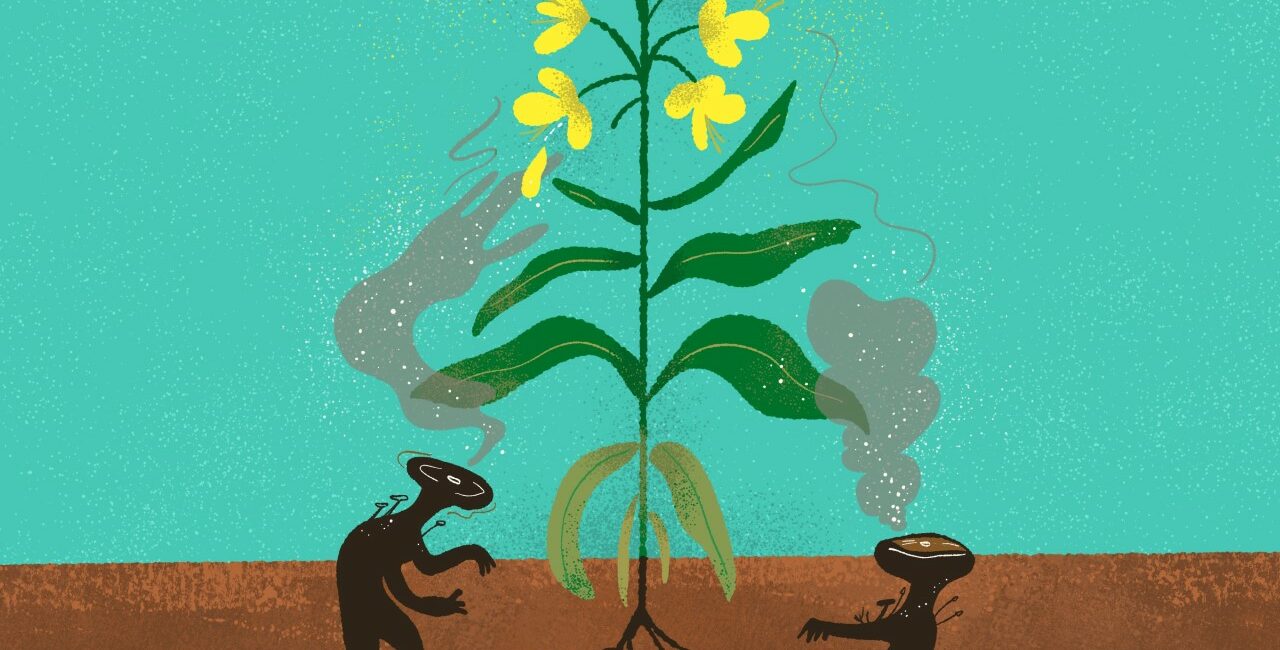
Have you lost sleep recently over invasive fungal spores? Probably not, unless you’ve been watching the The Last of Us, a hit sci-fi series shot in Alberta, or you are planning for a canola crop. There is good news for both groups, thanks to a patent for a biosensor just awarded to InnoTech Alberta inventor Dr. Xiujie Li.
First for the canola growers: sclerotinia fungus lurks overwinter in soil. Depending on conditions, largely related to moisture, it may or may not release its spores in harmful quantities in the spring. Losses to growers can range from 20 to 100 per cent — a huge amount in a crop worth $5 billion a year in Canada.
A response to sclerotinia requires fungicide, but its detection has proved difficult, requiring a one-week lab test that might easily cause a grower to miss the window for spraying. The other option is to work through a checklist and then decide how to proceed on gut feel.
Dr. Xiujie’s invention sits in the canola field safely inside a case, 20 inches by 16. It detects specific fungal antibodies in the atmosphere and emails the levels in real time to the grower. She has worked on this technology for 10 of her 21 years with InnoTech Alberta, first with support from the Alberta Canola Producers Commission and the Alberta Crop Industry Development Fund, then with support from the Canola Council of Canada and InnoTech Alberta. All along there has been much interest from farmers and agricultural companies who saw the invention in field demonstrations. This is her first patent.
Dr. Xiujie’s work was praised in October by the Canola Council as “a gold standard in providing timely results of sclerotinia presence.” They added, “We can appreciate the degree of troubleshooting involved in making this device functional, from separating debris from the spores to the design of the antibodies that specifically bind to sclerotinia ascospores.”
For the fans of The Last of Us: Dr. Xiujie is unfamiliar with the show, but she says that the technology could be used to detect other antibodies, including Covid, and in other settings. So, if the show’s stars had this invention, (spoiler alert) maybe they wouldn’t have had to blow up Edmonton’s “state house” after all.
A biosensor to fight invasive fungal spores and more
Canola growers know that in any season they can risk losing 20 to 100 per cent of their crop due to stem rot from sclerotinia fungus, which overwinters in the soil. Depending on conditions, mostly related to moisture, the fungus may or may not release its spores in harmful quantities.
A response to sclerotinia requires immediate application of fungicide, but its detection has proved difficult, requiring a one-week lab test that might easily cause a grower to miss the window for planting. The other option is to work through a checklist and then decide how to proceed on gut feel. The stakes are huge, as the Canadian crop is worth $5 billion.
There is good news for these growers, thanks to a patent just awarded to InnoTech Alberta inventor Dr. Xiujie Li, her first. She has produced a biosensor that sits in the canola field detecting specific fungal antibodies in the atmosphere and emailing the levels in real time to the grower. She has worked on this technology for 10 of her 21 years with InnoTech Alberta, first with support from the Alberta Canola Producers Commission and the Alberta Crop Industry Development Fund, then with the support of the Canola Council of Canada and InnoTech Alberta. All along, there has been much interest from farmers and agricultural companies who saw the invention in field demonstrations.
Her work was praised in October by the Canola Council as “a gold standard in providing timely results of sclerotinia presence.” They added, “We can appreciate the degree of troubleshooting involved in making this device functional, from separating debris from the spores to the design of the antibodies that specifically bind to sclerotinia ascospores.”
Further, Dr. Xiujie says that the technology could be used to detect other antibodies, including Covid, and in other settings, such as airports.